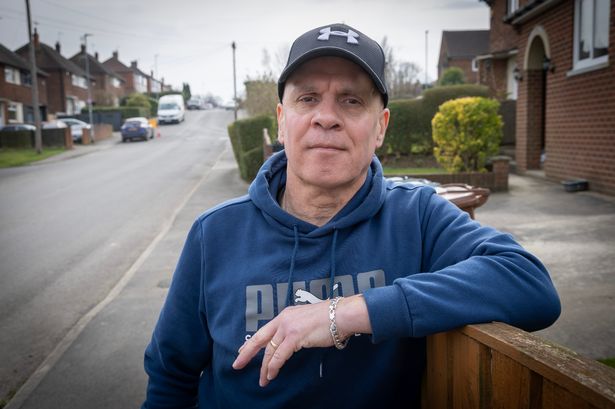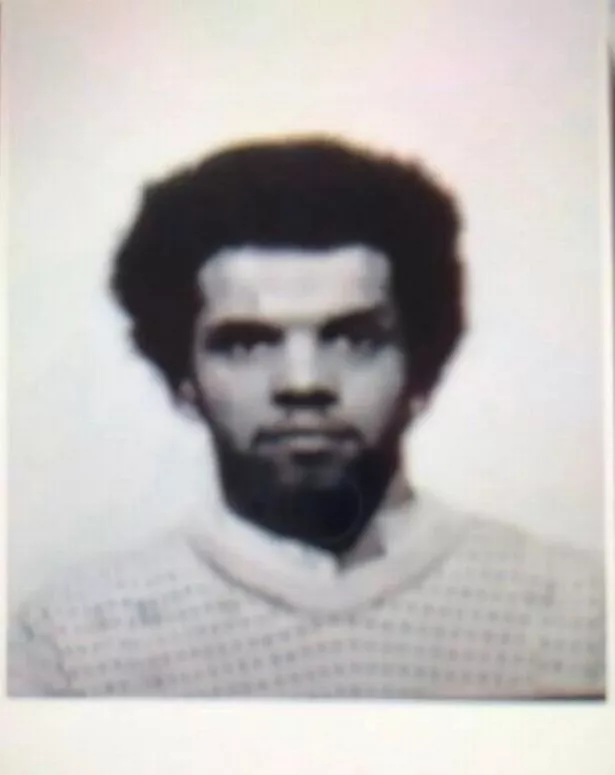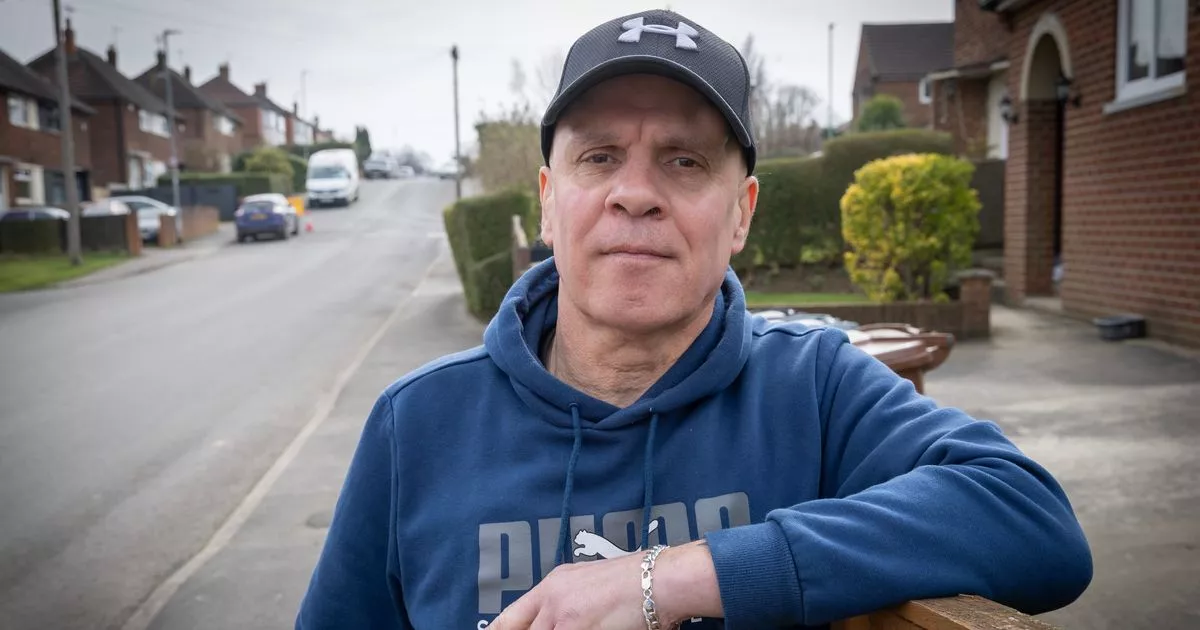Ray Gilbert served 36 years in prison for the murder of a betting shop manager in Toxteth. The CCRC is now reviewing his case. Ray Gilbert hoping to clear his name after he was wrongfully convicted of murder in a bookies(Image: Andy Stenning / The Mirror)
Ray Gilbert hoping to clear his name after he was wrongfully convicted of murder in a bookies(Image: Andy Stenning / The Mirror)
A man who spent 36 years in prison for a brutal murder he has always maintained he did not commit has been given fresh hope of clearing his name. Raymond ‘Ray’ Gilbert was 22 when he was one of two men convicted of the murder of betting shop manager John Suffield Jnr 19, who managed the Joe Coral betting shop on Lodge Lane in Toxteth.
Mr Suffield, 23, was opening up for the day on Friday, March 13 1981 when he was ambushed and attacked in what has always been referred to as a horrifically botched robbery. Mr Gilbert, now 66, has always maintained he is innocent of the heinous crime and has repeatedly attempted to exonerate his name, even spending an extra two decades in prison because of his refusal to confess.
A team supporting Mr Gilbert’s efforts submitted a new case review report to the Criminal Cases Review Commission (CCRC) last year, claiming that police investigating the stabbing “misinterpreted” the crime scene and missed signs that it was “staged to look like a theft gone wrong”.
The new report, which suggests an alternative sequence of events to the accepted narrative put forward by investigators, was submitted by forensic expert Stephanie Davies. After exclusively reporting Mr Gilbert’s latest bid for freedom earlier this year, the ECHO can now confirm that the CCRC has confirmed in a letter sent to Mr Gilbert’s legal representative that it was reviewing his case and will now decide whether to refer it to the Court of Appeal, which has the power to quash the conviction.
Speaking previously to the ECHO, Mr Gilbert said: “I’m innocent of murder, I will keep shouting that. I just want the opportunity to prove it. That will happen when the CCRC examines the case. I hope they act on the evidence and give me and the victim’s family justice. When you know you have not done it you will fight. I will fight to my last breath.”
In a letter seen by the ECHO, a CCRC case review manager responsible for looking at Mr Gilbert’s case, said: “When I have finished my review, the case will be passed to our commissioners for a decision. It is our commissioners who will decide whether the case should be referred to the court for an appeal.”
 Raymond Gilbert following his conviction for murder
Raymond Gilbert following his conviction for murder
The letter added: “The Criminal Appeal Act 1995 says that the CCRC cannot refer a conviction or sentence for an appeal unless there is a real possibility that the appeal will succeed. The real possibility must usually be based on new evidence or new argument that was not raised at trial or appeal.”
A spokesperson for the CCRC, an independent body that review possible miscarriages of justice, told the ECHO: “An application has been received in relation to this case and a review is underway. It would be inappropriate to comment any further while the review is ongoing.”
The case review manager said it is not known how long the review will take but it’s possible it could be passed to the commissioners for a decision by the end of September this year. The confirmation of a case review breathes new hope into Mr Gilbert’s journey to clear his name after six previous applications to the CCRC have previously been dismissed.
The ECHO understands from Mr Gilbert’s legal team that there is the potential for new forensic testing. It is understood the CCRC is currently reviewing thousands of cases following the acquittal of Andrew Malkinson, a Manchester man whose conviction for rape was quashed in 2023 after DNA evidence proved he was not the attacker.
The Court of Appeal heard there were major failures in the handling of Mr Malkinson’s case and investigators failed to follow up evidence right up to 2022. Mr Gilbert and his team told the ECHO they understand there are six exhibits of forensic evidence currently stored in boxes by the CCRC which could be the key to proving his innocence.
Mr Gilbert’s team can also take confidence in the strength of forensic evidence after Peter Sullivan, previously dubbed the “beast of Birkenhead” due to his conviction for the rape and murder of a young woman on the Wirral, was released from custody after nearly four decades following a high profile appearance at the Court of Appeal.
 Ray Gilbert hoping to clear his name after he was wrongfully convicted of murder in a bookies(Image: Andy Stenning / The Mirror)
Ray Gilbert hoping to clear his name after he was wrongfully convicted of murder in a bookies(Image: Andy Stenning / The Mirror)
Mr Gilbert’s application to the CCRC, previously seen by the ECHO, made a number of claims including: that the death scene had been misinterpreted by the police and the official accepted sequence of events was likely erroneous; there were signs of crime scene staging present at the scene that had been missed by the police at the time; due to this misinterpretation the police narrowed their suspect pool to just those with a history of theft; and the CCRC may have missed earlier opportunities to conduct a thorough forensic review.
In her written conclusion, Ms Davies claimed Mr Suffield’s death “was a planned murder by an individual or individuals known to him” by offenders “aware of the victim’s usual routine”. She said: “I believe the offender(s) knew that they would be considered prime suspects by the police, so they manipulated the scene to misdirect the police investigation.”
Mr Gilbert, a petty criminal from the local area, was arrested within three days of the suspected robbery-turned-murder and was interrogated by detectives for 48 hours without a solicitor present. During that time he changed his statement several times, before he confessed to the murder, which he now claims was false and given under duress.
He also implicated his co-accused, John Kamara, but withdrew his confession once he had access to legal representation. Despite the savagery of the killing, the busy location and the close-knit community of Toxteth during the 1980s, no physical or forensic evidence was ever uncovered linking the two men to the scene.
The pair were sentenced to life in prison after trial, but Mr Kamara was eventually acquitted 19 years later in 2000 when his legal team found a litany of issues including the lack of disclosure of witness statements.
The CCRC letter said due to Mr Gilbert’s previous applications, the case review manager can only look at points which have not been explored before. Ms Davies, who was previously a senior coroner’s officer for Cheshire, told the ECHO earlier this year: “The CCRC has never been aware that the police made some early errors. That is brand new information. The ideal outcome from this is a referral back to the Court of Appeal, but we know it will take time.”
Mr Gilbert, who remains a convicted murderer while he waits to find out if his latest application will be passed to the Court of Appeal, added: “I was a petty crook who did things I’m not proud of, but I never murdered anyone. I will continue to fight until the day I die.”
